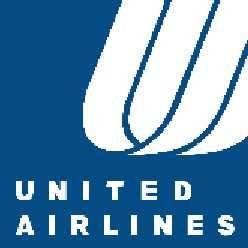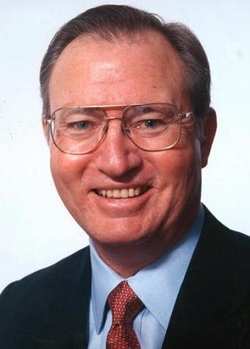Predicts A Different Company Come This Autumn
 Blue skies
Blue skies
Smiling at me
Nothing but blue skies
Do I see
Bluebirds
Singing a song
Nothing but bluebirds
All day long
--Irving Berlin
If you hear that tune in Chicago these days, chances are, it's
being sung by United Airlines CEO Glenn Tilton. But the chances are
equally good that not everyone close to United's bankruptcy ordeal
is singing the same song.
"Our employees will be able to turn all their attention to the
consumer, to the customer, to competition," Tilton said on
Thursday, predicting his airline will emerge from the protection
and supervision of a Chicago federal bankruptcy judge before the
ordeal enters its third year.
 Tilton (right) was quoted by
the Chicago Tribune.
Tilton (right) was quoted by
the Chicago Tribune.
As United's bankruptcy has stretched longer than anyone in the
company and most of those closely observing had thought possible,
the airline has lost $4 billion. Tilton and company have been able
to negotiate $7 billion in annual cost savings, but critics of the
airline tell the Tribune a more aggressive leadership team could
have done it months ago. Tilton said he originally pictured a
bankruptcy lasting about 18 months.
"They had the wrong guy bringing them into bankruptcy, and he's
no better to bring them out of bankruptcy," William Brandt, a
turnaround expert with Chicago-based Development Specialists Inc.,
told the Tribune. Brandt's company provides management and
consulting services to financially troubled businesses. "They need
to rethink this whole thing top to bottom, probably change the
board."
But Tilton says the groundwork he and his managers have laid
down makes United a much better competitor -- and just in time. He
points out Delta's new, aggressive fare structure. "We're in far
better shape today to deal with Delta's Simplifares than we would
have been two years ago," Tilton told the Tribune. "We're in better
shape because over the last two years we've learned this is not a
short-term phenomenon, and we're going to have to compete on the
basis of fare-value for business."
But University of Chicago Law Professor Douglas Baird, an expert
in bankruptcy matters, isn't sure United's changes and its new
ability to compete will be enough. Remember, United is now the
nation's second-largest carrier, behind American.
"It's really not known" Baird told the Trib. "We don't know in
this post-regulatory environment, once the impact of 9/11 is over,
and SARS is over; once traffic comes back to normal, and we see
what the steady price is going to be on fuel and so forth. Nobody
really knows if the country can support more than one hub-and-spoke
carrier."
The Voice Of Experience
 Then there's Gordon Bethune, who
recently left Continental Airlines in a long-running feud with
moneyman David Bonderman. Bethune knows a little something about bankruptcy,
having guided the Houston-based carrier out of that maze himself
back in the mid-1990s.
Then there's Gordon Bethune, who
recently left Continental Airlines in a long-running feud with
moneyman David Bonderman. Bethune knows a little something about bankruptcy,
having guided the Houston-based carrier out of that maze himself
back in the mid-1990s.
"Bankruptcy court won't fix your company," he said. "A judge,
quite frankly, doesn't know the front end of an airplane from the
back," he told the Tribune. Bethune declined to comment on United's
efforts but said that too many companies ignore fundamental
problems. "It's not about just low cost," he said.
Take, for instance, last year's bankruptcy filed by ATA
Airlines. "Look, you can make a pizza so cheap that no one is going
to want to eat it. And you can make an airline so cheap no one is
going to want to fly it," Bethune said.
But Tilton told the Chicago paper that critics could well be
overworking the problem. "The issue is really a seat and an
experience," Tilton said. "If Marriott can afford a suite of
products that goes from luxury to economy, so, certainly, can we.
It's really all about customer expectations."
 Classic Aero-TV: Pure Aerial Precision - The Snowbirds at AirVenture 2016
Classic Aero-TV: Pure Aerial Precision - The Snowbirds at AirVenture 2016 NTSB Final Report: Costruzioni Aeronautiche Tecna P2012 Traveller
NTSB Final Report: Costruzioni Aeronautiche Tecna P2012 Traveller ANN's Daily Aero-Linx (11.23.25)
ANN's Daily Aero-Linx (11.23.25) ANN's Daily Aero-Term (11.23.25): Request Full Route Clearance
ANN's Daily Aero-Term (11.23.25): Request Full Route Clearance Aero-News: Quote of the Day (11.23.25)
Aero-News: Quote of the Day (11.23.25)





